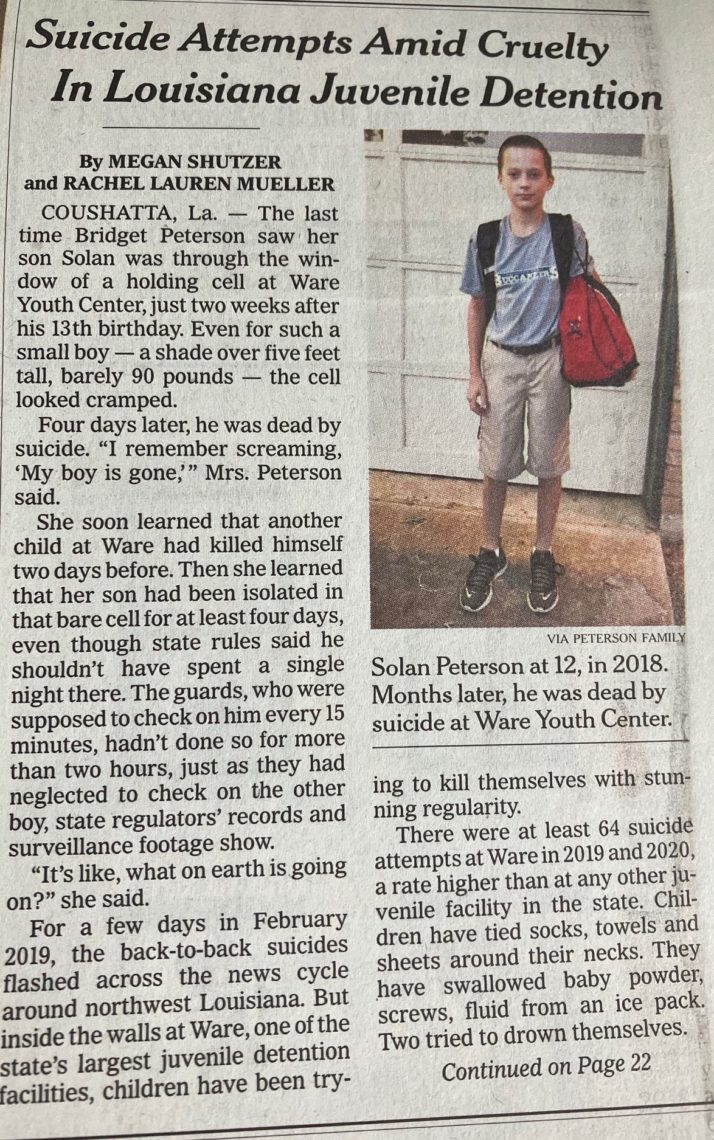Two back-to-back suicides at a juvenile detention center in rural Louisiana raise troubling questions about the state’s justice system and exposes a legacy of abuse and neglect. The explosive findings by recent J-School graduates appear in a documentary short and on the front page of the country’s newspaper of record.
On Oct. 30, Berkeley Journalism alumni Meg Shutzer and Rachel Lauren Mueller (‘20) published an investigation into an egregious legacy of abuse and neglect at Ware Youth Center in Louisiana on the front page of The New York Times. The story follows on the heels of their 26-minute documentary short “8 Days at Ware,” which premiered at the Double Exposure Film Festival in Washington, D.C., three weeks earlier.

Their reporting centers on the back-to-back suicides at Ware juvenile detention facility that took the lives of 13-year old Solan Peterson and 17-year old Jordan Bachman. Over the course of three years, the pair would interview over 160 people, some 115 who had been held at Ware or worked as staffers, who alleged guards routinely punished, degraded, or inflicted pain on their charges.
Through public records requests, Shutzer and Mueller discovered an astonishing 64 suicide attempts at the facility in 2019 and 2020 — the highest rate of suicide attempts at any juvenile facility in Louisiana, according to records from the Louisiana Department of Children and Family Services and Office of Juvenile Justice. The investigation also found numerous cases of sexual abuse at Ware.
Shutzer first heard of the Ware Youth Center after she attended an investigative reporting seminar at Berkeley Journalism, where she was introduced to Ahmed Lavalais, a clinical teaching fellow at Berkeley Law’s Policy Advocacy Clinic. At the time, Shutzer, an award-winning documentary filmmaker who has degrees from Harvard and Stanford, was teaching video classes at San Quentin State Prison as part of her graduate work and was deepening her reporting on criminal justice issues. She embedded in the clinic and traveled with Lavalais’ team to Louisiana to explore the impact of juvenile incarceration on children and families.
In the summer of 2019, Shutzer connected with Peterson’s grandmother, who wanted to share his story, and teamed up with fellow documentary film student Rachel Mueller to produce it as a joint thesis film. Mueller is a documentary filmmaker and cinematographer with a background in community-led storytelling, who has focused her reporting in rural America.
Their reporting evolved into something much bigger than they had initially storyboarded. “It quickly became clear that we were uncovering more than we would be able to fit into the constraints of a 26-minute thesis film that had to be completed by graduation,” Shutzer explained. “Over the next year, we worked with the doc program and the Investigative Reporting Program to produce the film and launch a deeper investigation into the facility.”

Filmmakers Meg Shutzer (‘20) and Rachel Mueller (‘20) at the premiere of “8 Days at Ware” at the Double Exposure Film Festival in Washington, DC October 14, 2022.
The team secured funding from both the Tribeca Film Institute’s IF/Then Shorts and the Fund for Investigative Journalism, and they found an active mentor in one of the top investigative reporters in the country, Professor David Barstow, the Reva and David Logan Distinguished Chair in Investigative Reporting who leads the IRP.
“From our first meeting with David, it was clear that he believed this story needed to be told,” Shutzer said. “That was three years ago. He has been fighting for us to make it happen ever since — both working in the background to secure funding and connect us to the Times, and spending hours hands-on in the reporting and writing.”
“David has remarkable patience,” Mueller said. “He has taken tremendous time with us, using every moment to teach us new skills and shepherd us forward. He is committed both to this story, but also to supporting us becoming the best journalists we can be. I am exceedingly grateful for his tutelage and to have worked so closely with him for so long.”
Barstow called the 6,400-word investigation a testament to what the IRP is about, empowering students to produce revelatory and essential journalism.
“It has been a privilege to witness the way Rachel and Meg peeled back each horrifying layer of this story these last three years through relentless, meticulous, deeply empathetic reporting,” he said, “What they’ve exposed — after overcoming innumerable obstacles ranging from the pandemic to obstinate public records custodians — reflects their sheer determination to find and document the terrible truth about one of Louisiana’s largest juvenile facilities.”
Filmmakers and fellow alums Cassandra Herrman (‘01) and Kelly Whalen (‘01) served as the pair’s thesis advisers. “They approached the film with such deep care for the families and survivors whose stories they were representing, and did a beautiful job of balancing searing reporting with personal stories of loss, anger and resilience,” Herrman and Whalen reflected jointly about the film.
Because this project focused on a youth detention facility, Shutzer explained, “You can be sure that Rachel and I, both white, grappled with whether we were the right people to tell this story about a system that disproportionately affects Black kids. I appreciate Rachel for many reasons, but one of them is that we were so aligned on this concern and committed to seeking out feedback from people with different identities, looking for our blindspots, and approaching the story through an anti-racist lens.”
Shutzer added, “In the end, we kept going because we felt a responsibility to the people who trusted us with their stories to report what we were finding. Kids should never be able to complete suicide in state custody. It was a tragedy and these deaths were preventable.”
By Aysha Pettigrew and Marlena Telvick


